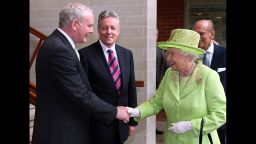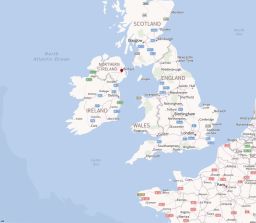Story highlights
McGuinness will not contest the March election
Former IRA commander cites health
Irish republican leader Martin McGuinness, a former IRA commander and, until last week, the deputy first minister of Northern Ireland, announced Thursday he is retiring from politics.
McGuinness, of the Sinn Fein party, last week stepped down as minister in protest of the handling of an energy program by the Democratic Unionist Party (DUP). That decision prompted a snap Northern Ireland Assembly election that is due to be held on March 2.
In a statement released Thursday, McGuinness said he had originally planned to step down in May.
“Unfortunately, my health and the current crisis have overtaken this time frame and I am stepping down from my role to make way for a new leader of Sinn Fein in the North,” McGuinness said.
“After long and careful consideration, I have decided that it is time for a new generation of republicans to lead us into this election and the negotiations that will follow,” he added.
Hails from Bogside

McGuinness grew up in Derry’s Bogside, one of the epicenter’s of “The Troubles,” Northern Ireland’s decades’ long sectarian conflict.
He became an IRA commander, later becoming Sinn Féin’s chief negotiator in Northern Ireland’s peace process, which gave rise to the Good Friday Agreement.
In 2012, McGuinness and Britain’s Queen Elizabeth II made history when they shook hands during the Queen’s visit to Northern Ireland.
On Thursday night, McGuinness was joined by supporters in Derry’s Bogside celebrating his career.
Power sharing

Northern Ireland is one of four regions that make up the United Kingdom. Sinn Fein, a party that is primarily supported by Catholic Irish nationalists, wants Northern Ireland to secede from the UK and become part of the Republic of Ireland. The Democratic Unionist Party, primarily supported by Protestants, wants the region to remain a part of the United Kingdom.
The landmark 1998 Good Friday Agreement helped bring an end to decades of violent sectarian conflict in the region. The agreement laid out plans for a power-sharing government, as a result despite having bitterly opposing politics, Sinn Fein and the DUP share power.
“The institutions are now in a deep crisis as a result of recent events and we are facing into an election when the people will have their say,” McGuinness said.
Standing down
McGuinness led Northern Ireland’s government with First Minister Arlene Foster of the Democratic Unionist Party (DUP).
McGuinness announced his decision to step down as deputy first minister after Foster refused to step down following an inquiry into the handling a botched green energy program. Foster was minister of the department responsible for the program at the time. Foster branded McGuinness’ decision to step down as deputy first minister as “purely political.”
On Thursday, Foster wished McGuinness a speedy recovery following the announcement of the Irish republican politician’s decision to retire.
“While the current political situation is not what any of us would wish and there is much work to be done to return stable government to Northern Ireland I nonetheless value the good things achieved by the outgoing Executive and the contribution made by Mr. McGuinness to it,” Foster said in a statement.
Reaction
Among the first to react to the news was Sinn Fein colleague Gerry Adams.
“I want to express my heartfelt thanks to Martin McGuinness. He and I first met over 45 years ago behind the barricades in Free Derry and we have been friends and comrades since that time.”
James Brokenshire, secretary of state for Northern Ireland, paid tribute to McGuinness “for his work in securing a number of significant political agreements.”
McGuinness said he’s determined to play a “full and enthusiastic” role as a Sinn Fein activist, and reiterated his support for the unification of the Republic of Ireland and Northern Ireland.
“It remains my own personal and political ambition to break the link with Britain and to unite all who share this island under the common banner of Irish men and women.”




